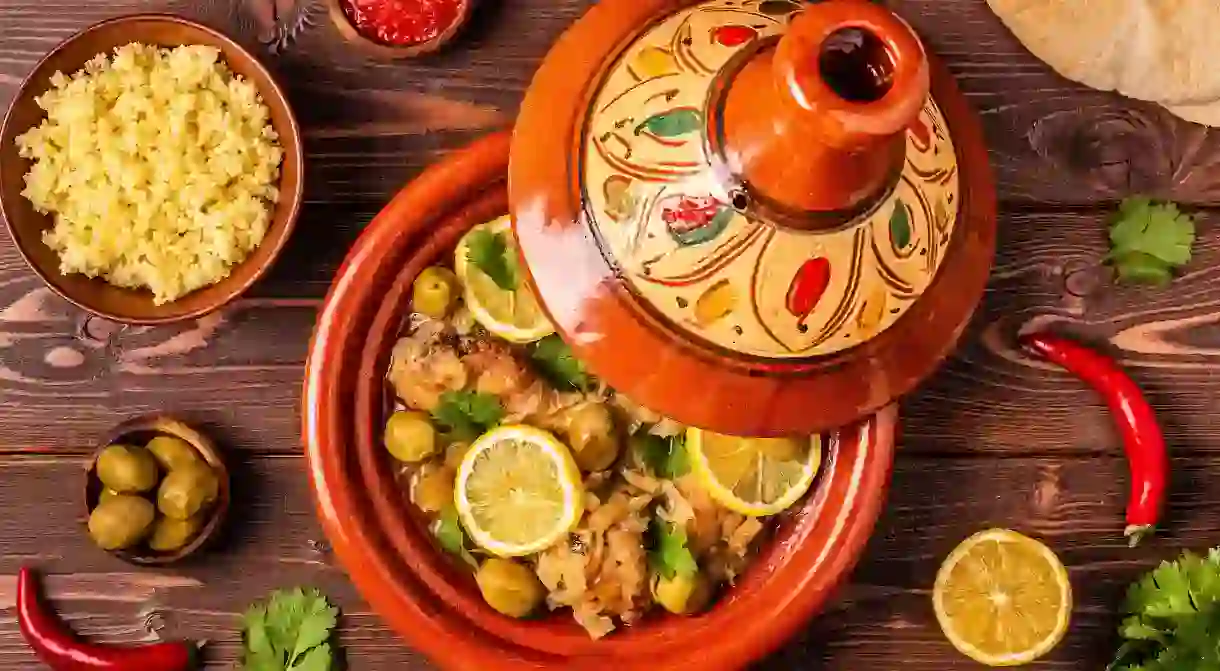Dishes to Try in Morocco

Morocco’s food scene is one of the best in the world, with Arabic, Jewish, Berber, sub-Saharan and even Roman influences making for unique cuisine. This is hardly surprising given the country’s history as a crossroads between Africa, Europe and the Middle East. Within Morocco, the cuisine varies greatly based on the region – pastilla in Fez, medfloun in the Sahara region, sardines in coastal Safi and tanjia in Marrakech. Here’s our list of must-eats during your travels in Morocco.
Want to try Moroccan cuisine? Book Culture Trip’s 13-day Moroccan adventure and explore local markets and medinas under the guidance of our Local Insider.
Pastilla

A specialty of the Fez region, where flaky pastry is stuffed with pigeon and almonds and flavored with a variety of spices including saffron and cinnamon, this savory-sweet dish is often served during wedding celebrations and special occasions. Wander through the medinas and you’ll find it for sale at the food stalls throughout Fes medina near Bab Boujloud. A seafood version is also available, stuffed with shrimp, calamari, fish and vermicelli noodles. Be sure to order a mint tea to wash it all down.
Tanjia
A Marrakech specialty, tanjia is prepared either in the home (traditionally by men) or by the local butcher who slow-cooks the braise over the same coals that heat local hammams. Prepared with beef, lamb or chicken and a blend of spices and preserved lemons, the tanjia pot is covered tightly with butcher’s paper before roasting for up to eight hours. Served in a clay tajine pot with the juice from the meat, it’s perfect when scooped up with fresh bread.
Mechoui

This dish is slow-cooked (often overnight) in an underground oven where a whole lamb is cooked over coals until falling off the bone. Cumin and a pinch of salt provide the perfect seasoning to the tender mechoui, which is often served during weddings, but also in the so-called mechoui alley in Marrakech just off Jemaa el Fna, by the olive souk. Best washed down with a very sweet cup of tea, or three!
Sardines
Either grilled at a local barbeque in Essaouira and enjoyed al fresco with fresh tomato, onion and pepper salad or thrown into a tajine with tomato sauce served with fresh bread. For a quick eat, grab a sardine kefta sandwich stuffed in a loaf of bread from a small unassuming shop in the medina. A major industry in the Safi region, fresh sardines are as readily available as tinned here. Be sure to check the freshness of sardines prepared on the street.
Makouda
Another small snack available throughout Morocco’s medinas, particularly in the north in places such as Meknes, Fez and Moulay Idriss, makouda is essentially a deep-fried potato cake. Eaten individually or stuffed in a sandwich for a carbohydrate overload, makouda make a lovely side to a salad, though they are rather heavy.
Couscous

Most often served on Friday at lunchtime, couscous is served in a large round platter for sharing amongst family following the weekly Friday prayers. Topped with seven vegetables – aubergine, courgette, carrots, pumpkin, potatoes, onions, cabbage – there are also caramelised onions, chickpeas and either beef or chicken added. Couscous is often served with a glass of leben (fermented milk).
Tajine
The varieties range from lemon chicken tajine with green olives to kefta (meatballs) with eggs. In the Atlas Mountains, a Berber tajine prepared with in-season vegetables includes peas, zucchini, tomatoes and potatoes and perhaps chicken or beef hidden beneath the mountain of vegetables. A pure delight when scooped up with fresh bread.
Patisseries

It wouldn’t be a trip to Morocco without sampling some of the finest homemade patisseries prepared using orange blossom water, rose water, almond paste and other fine ingredients. Be sure to try chebakiya cookies with a bowl of harira (vegetable soup) for a truly local experience, or gazelle’s horns with a cup of mint tea as an afternoon treat. In Essaouira, the small bakeries throughout the medina sell fine treats while Al Jawda and Patisserie de Prince serve a wide selection in Marrakech.
Dried fruits and nuts
With plenty of nut trees in the Atlas Mountain regions, almonds and walnuts are picked and roasted locally while dates are grown in abundance in southern Morocco. Harvest is in the fall when locals climb the date palms to shake the fruit to the ground. The best place for tasting dates is in Rissani at the date market, but dried fruit, nut and date shops abound throughout the country. Dried apricots and figs are also popular and are often available for sampling at the small shops.
Grilled meats
Street food is great in Morocco and grilled meats are among the finest offerings. Stop by the food grills in Moulay Idriss for mouth-watering grilled kefta, tomatoes and onions washed down with a soda and served with fresh bread. Merguez sausages, liver skewers and lamb skewers should be top of the agenda in Marrakech.













